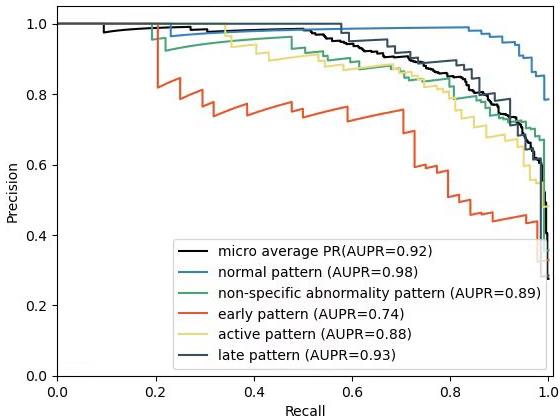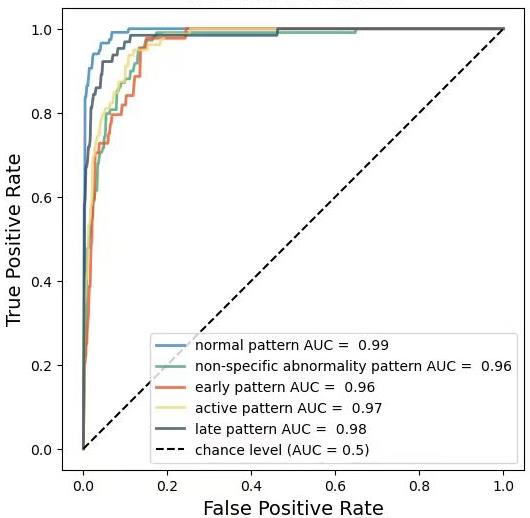Session Information
Session Type: Poster Session C
Session Time: 9:00AM-11:00AM
Background/Purpose: Detection of specific abnormalities in capillaries, named scleroderma patterns, by nailfold capillaroscopy (NFC) is one of the most important means to diagnose systemic sclerosis (SSc). In addition, different stages of the scleroderma pattern (the early, active, late stage) reflect the activity and severity of the disease. However, the reliability of the NFC images evaluated by rheumatologists was unsatisfactory. We aim to develop and validate a deep learning system for identifying scleroderma pattern from non-scleroderma patternand further classifying different stages of scleroderma pattern.
Methods: NFC with a 200x magnification was used to acquire images from the second, third and fourth fingers of both hands. Majority votes of three rheumatologists to judge the five NFC patterns (normal, non-specific, early, active and late pattern)derived ground-truth labels. NFC-captured images were randomly assigned to the train and validation sets in a 8:2 ratio. Images analyzed using ResNeXt, a deep learning technique. The outcome investigated was the ResNeXt‘s ability to identify different stages of NFC patterns. The performance of the model was assessed by estimating areas under the precision recall curvesand the receiver operating characteristics curves (ROCs).
Results: Nailfold capillaroscopy (NFC) was performed in 274 adult participants from two clinic medical centers, including 140 SSc and 134 controls (74 healthy controls, 27 with primary Raynaud’s phenomenon, 48 with metabolic syndrome). A total of 2893 high-resolution NFC images were obtained, with an average of 10.6 images per participant. In the validation set, ResNeXt had good performance in identifying the different patterns in NFC images with areas under theprecision recall curves (AUPR) from 0.74 to 0.98, and with areas under the ROCs (AUC) from 0.96 to 0.99.
Conclusion: The ResNeXt is a well-performing tool for identifying scleroderma patterns in SSc from controls, and it may assist rheumatologistsin generating consistent and high-quality assessment of microcirculation abnormalities.
To cite this abstract in AMA style:
Zhuang Y, Wang Z, Zhu J, Yu Y, Liu Y. A Deep Learning System for Automated Assessing Microcirculation Abnormalities in Nailfold Capillaroscopy Images of Systemic Sclerosis [abstract]. Arthritis Rheumatol. 2023; 75 (suppl 9). https://acrabstracts.org/abstract/a-deep-learning-system-for-automated-assessing-microcirculation-abnormalities-in-nailfold-capillaroscopy-images-of-systemic-sclerosis/. Accessed .« Back to ACR Convergence 2023
ACR Meeting Abstracts - https://acrabstracts.org/abstract/a-deep-learning-system-for-automated-assessing-microcirculation-abnormalities-in-nailfold-capillaroscopy-images-of-systemic-sclerosis/


